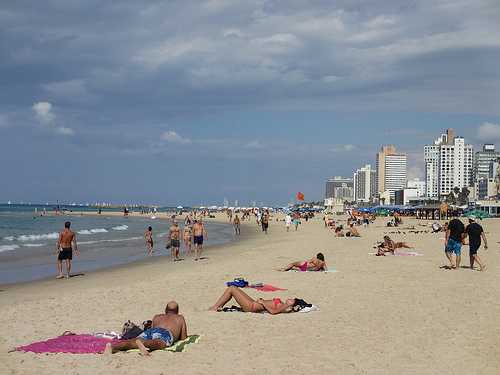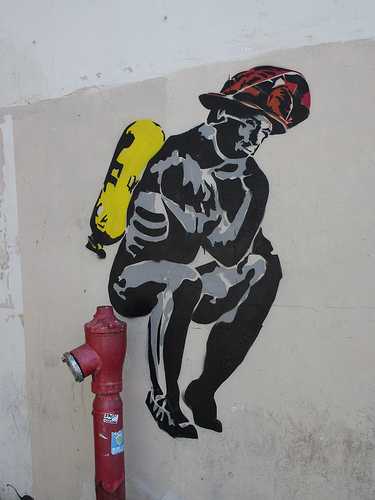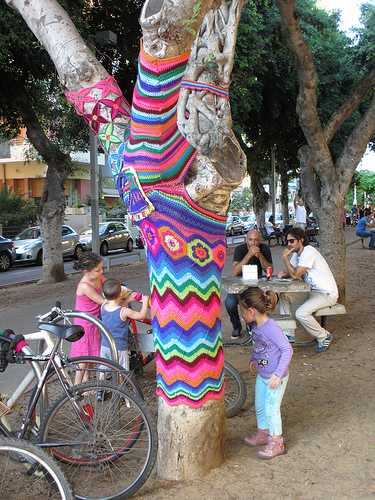Craig and Sal Go Global
Tel Aviv
November 09, 2012
Sooner or later every traveller goes through the rite of passage of trying to sleep at the airport. Having travelled through the evening, we arrived at the airport near Tel Aviv at 3:00am. We were meeting our CouchSurfing host at a more reasonable hour, so we had a six hour “stay” ahead of us. We came equipped with eye masks, ear plugs and inflatable cushions – to no avail. The awful airport furniture ruined any prospect of sleep.
Luckily our host Tom had been out the night before, so we were all feeling much the same way that day! We had to occasionally excuse ourselves for a quick power nap, but otherwise still enjoyed ourselves and stayed up until a normal(ish) bedtime. We quickly learnt that every Israeli has their own interpretation of the “best hummus in Israel”, so we went out for lunch together and enjoyed the first of many hummus and falafel platters.
We had two days in Tel Aviv and spent the time cycling and walking around the city with Tom. Although the metropolitan area has 3.4 million people, the city is reasonably compact and we had seen a lot by the end of our visit.
We’re not sure quite what we were expecting, but our first impressions of Tel Aviv surprised us. The neighbourhood surrounding the train station where we arrived was shorter, older and a bit more run-down that we were expecting. We later learnt that this neighbourhood is one of the poorest in the city. Once we got further towards the centre we saw more of the modern tower blocks we were expecting. Knowing about all the European migration to Israel and the country’s close ties to the USA, we perhaps expected more of a westernised feel to Tel Aviv, but it is very much a Middle Eastern city. The city has lots of vibrant neighbourhoods full of restaurants and galleries. We also really enjoyed swimming at the beach in the warm ocean.
One thing we noticed immediately was the military presence in Israel. Almost every Israeli goes through 2-3 years of compulsory military service from age 18. The young soldiers are a ubiquitous sight at bus stops around the country as they travel to and from their bases. We quickly got used to seeing armed soldiers around. However, some soldiers carry their rifles while off-duty and it remained strange to us to see casually dressed teenagers walking around with rifles slung across their backs!
Of course Israel has had a tumultuous history since its founding in 1948. Seven wars, two closed borders and ongoing political and military conflicts mean that security is of major importance to the country. As well as having compulsory military service, public bomb shelters are commonplace and all Israelis are required to keep a gas mask at home. Thankfully things have been relatively quiet recently, although it was only a few years ago that the country was wracked by violence during the Second Infitada.
We did our best to learn about some of Israel’s complex and contested history throughout our time in the country, but we’ve come away feeling well short of a full understanding. We will try to share further bits of what we have learnt in our upcoming posts, although of course we will not be able to adequately express all of the detail and differing points of view that exist.
Israel is coming up to a general election, and for once it is not security but the economy which is the biggest issue. Sadly, this is because the country is facing a big escalation in living costs without an equivalent rise in wages. We did notice how expensive things were – particularly dining out, groceries, alcohol and petrol. In fact, prices were higher here than in any European city we’ve been to. With an average wage similar to New Zealand, it wasn’t hard to imagine how people must be struggling. The issue was on the mind of every Israeli we talked to, and there have even been large scale public demonstrations.
Why is the cost of living so high in Israel? We heard a few reasons. Firstly, import restrictions and tariffs raise the price of imports, which is made worse by a lack of domestic competition. Taxation in Israel is very high, due in part to the burden of defence spending (the highest per capita in the world). Also, a significant proportion of the population doesn’t work for religious reasons and are reliant on welfare (we will talk about this a bit more in our post on Jerusalem).
On our last night in Tel Aviv we were invited to join a poker game on the rooftop of Tom’s building. These guys play poker at least once a week, so we were pretty pleased to come away with a profit. It’s the first time on this trip that we’ve had income rather than costs!
Israel is a small country but some areas are best explored by car. We’ve rented one for the next four days to explore Northern Israel and then the Dead Sea in the south before returning the car to Jerusalem. If you’ve got any questions about our time in Israel, ask us in the comments section, and we’ll do our best to answer them in our upcoming posts. Bye for now.

Written by Craig Drayton and Sally Robertson




